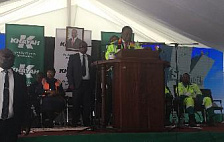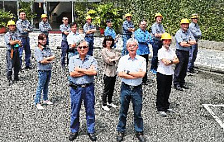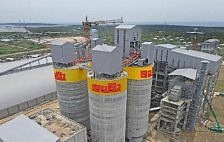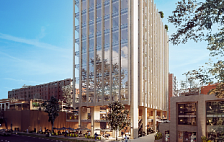- Heidelberg Materials pioneers new process technologies in France to drive circularity and decarbonisation
- As a first in France, the project CIRCO₂BETON® selectively separates demolished concrete into sand, aggregates, and recycled concrete paste (RCP)
- RCP, carbonated with CO₂ from clinker production, will replace clinker in new low-carbon cements
- The project has the potential to reduce the CO₂ emissions of the Ranville cement plant by 20%
As part of its decarbonisation strategy, Heidelberg Materials pioneers a large-scale closed-loop recycling project called CIRCO₂BETON®. As a first in France, the company will install an industrial scale selective separation platform at its Achères quarry near Paris, where demolished concrete will be crushed using novel processes and separated into its components: sand, aggregates, and recycled concrete paste (RCP).
The high-quality recycled sand and aggregates will be reincorporated into new concrete. The RCP will be transported to the Ranville cement plant in the Normandy region. There, a reactor for enforced carbonation will be installed to carbonate the RCP by exposing it to CO₂-containing exhaust gases from the kiln. The carbonated RCP acts as a carbon sink and will replace clinker in new low-carbon cement types. The project has the potential to reduce the CO₂ emissions of the Ranville cement plant by 20%.
CIRCO₂BETON® is supported by the “Investment for the Future” Program (PIA) coordinated by the Ecological Transition Agency (ADEME). In addition, the Île-de-France region supports the selective separation plant at Achères through its zero-waste and circular economy plan. Subject to the funding, construction of both industrial pilots is scheduled to start in 2024 with production of RCP starting in 2025. The carbonation reactor is planned to be operational by 2026.
“This most recent investment in France underlines Heidelberg Materials’ strong commitment to decarbonise our products and drive the circular economy in the construction industry,” says Jon Morrish, member of the Managing Board and responsible for Western and Southern Europe. “It’s great to see this pioneering project being supported by the “Investment for the Future" Program (PIA) and the Île-de-France region. The project will help to significantly decrease Heidelberg Materials’ carbon footprint in France.”
Dr Nicola Kimm, Chief Sustainability Officer and member of the Managing Board, adds: ”We are investing in a pioneering large-scale project based on innovative process technologies. Selective separation and CO₂ mineralisation are important levers to reduce the carbon footprint of our products. By closing the materials loop, we prove that concrete has the potential to be the most sustainable building product over its entire life cycle from production to recycling.”
The project is fully in line with the company’s climate strategy, which has set targets to reduce specific net CO₂ emissions per tonne of cementitious material by 47% by 2030 compared to 1990. The company also aims to achieve 50% of its revenue from sustainable products that are either low-carbon or circular by 2030, and to achieve net zero carbon emissions by 2050 at the latest.








